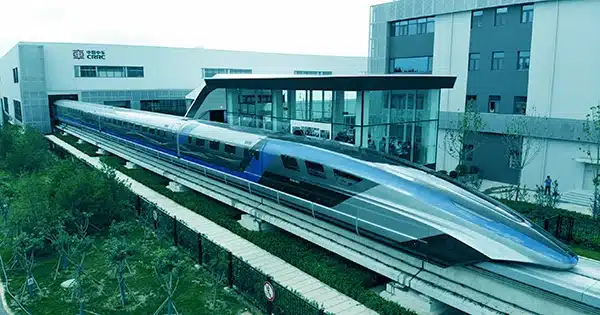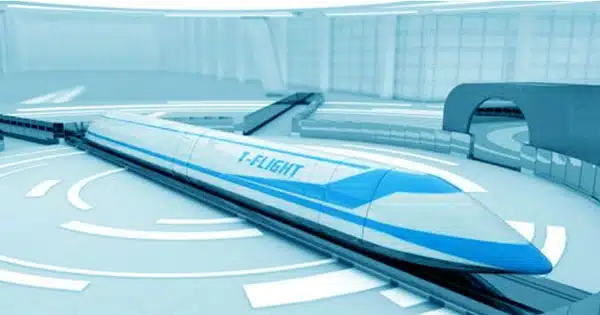China’s equivalent to the Hyperloop, an ultra-high-speed maglev train, just smashed its speed record, reaching speeds of over 623 kilometers (387 miles) per hour on a full-scale test track.
The project is being managed by the China Aerospace Science and Industry Corporation (CASIC), a state-owned aerospace organization that manufactures rockets, missiles, satellites, and spacecraft.
In a non-vacuum test run in 2023, the train set a new speed record of 623 kilometers (387 miles) per hour. According to the South China Morning Post, CASIC reports that recent testing has beaten prior records. For the time being, the exact speed is said to be classified.
Furthermore, the test was completed in a low-vacuum tube, demonstrating that maglev technology operates as planned. The innovative train system beat the speed record on a full-scale 2-kilometer (1.2-mile) test track in Datong, Shanxi province, northern China.

The vehicle uses maglev technology, which uses magnets to propel the train ahead and lift it above the tracks, decreasing friction. To increase its speed, the train passes through a specially built low-vacuum tube that decreases air resistance.
Technology is advancing at an astonishing rate. In October 2022, CASIC boasted a train test run that achieved 130 kilometers (81 miles) per hour. The most recent attempt is more than four times faster.
There could be more to come. CASIC has previously shown interest in shuttling trains at a maximum speed of 1,000 kilometers (620 miles) per hour, and they hope to develop technology that can go as fast as 4,000 kilometers (2,485 miles) per hour.
Before the CASIC record, the fastest hyperloop speed was 463 kilometers (288 miles) per hour, set by a team of engineers from the Technical University of Munich in July 2019.
As of 2018, just six maglev train systems were operational around the world: three in China, two in South Korea, and one in Japan. Unlike hyperloops, which employ low-pressure tunnels, all of these trains travel in the open air.
Maglev trains can travel at incredible speeds, but they are exceedingly expensive. They also consume a significant amount of energy and require their dedicated infrastructure, which is difficult to integrate into existing transportation systems.
Meanwhile, outside of China, Hyperloop One, the company behind Elon Musk’s futuristic transportation system, went out of business late last year.
However, the dream of hyperloop technology is far from gone. There has been speculation of a commercial hyperloop system in Italy, which would connect Venice-Mestre and Padua in less than 15 minutes. Keep in note, however, that the train travel between Mestre and Padova currently takes approximately 14 minutes.
















